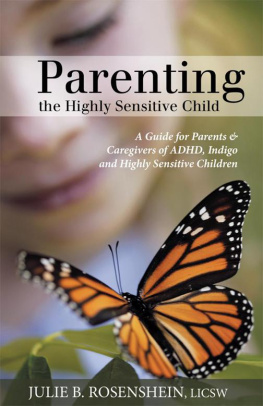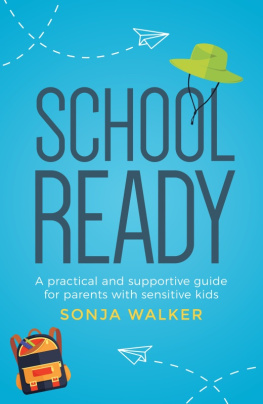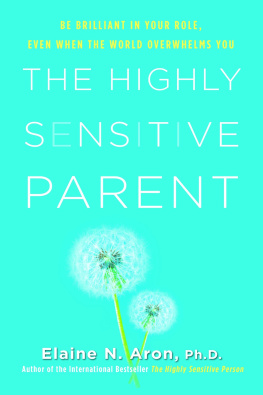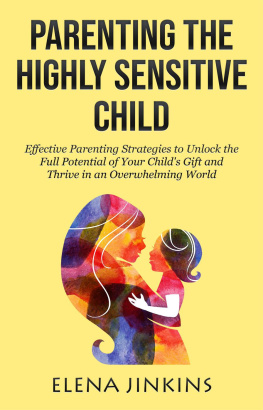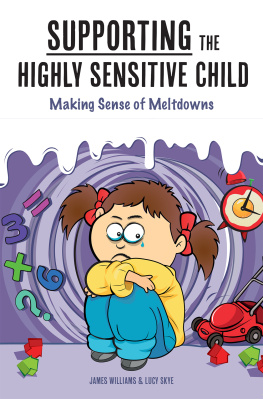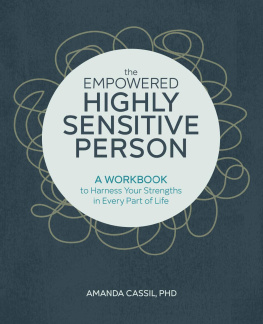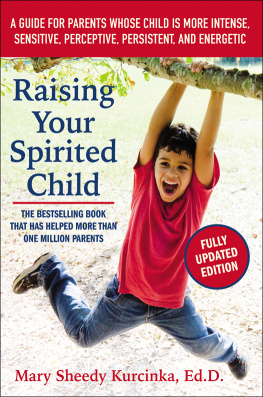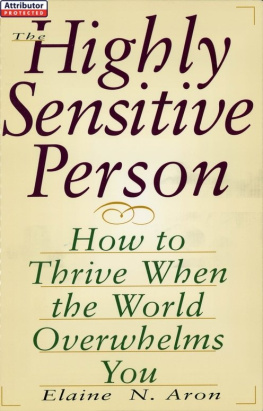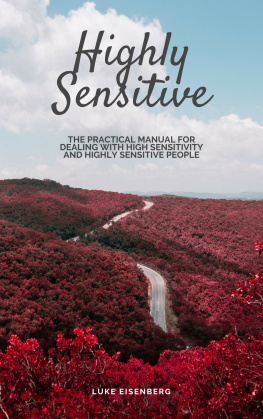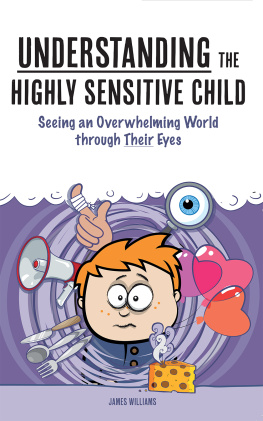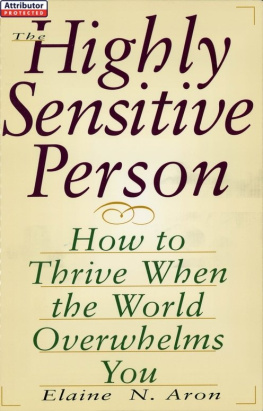More than a guidebook on Highly Sensitive Children it is a must read for any parent!
-Lee Carroll
Parenting the
Highly
Sensitive
Child
A Guide for Parents & Caregivers of ADHD,
Indigo and Highly Sensitive Children
JULIE B. ROSENSHEIN
Foreword by Lee Carroll:
Author of The Indigo Children

Copyright 2013 Julie B. Rosenshein.
All rights reserved. No part of this book may be used or reproduced by any means, graphic, electronic, or mechanical, including photocopying, recording, taping or by any information storage retrieval system without the written permission of the publisher except in the case of brief quotations embodied in critical articles and reviews.
Balboa Press books may be ordered through booksellers or by contacting:
Balboa Press
A Division of Hay House
1663 Liberty Drive
Bloomington, IN 47403
www.balboapress.com
1-(877) 407-4847
For privacy and protection names and identifying details have been changed or omitted.
Because of the dynamic nature of the Internet, any web addresses or links contained in this book may have changed since publication and may no longer be valid. The views expressed in this work are solely those of the author and do not necessarily reflect the views of the publisher, and the publisher hereby disclaims any responsibility for them.
The author of this book does not dispense medical advice or prescribe the use of any technique as a form of treatment for physical, emotional, or medical problems without the advice of a physician, either directly or indirectly. The intent of the author is only to offer information of a general nature to help you in your quest for emotional and spiritual well-being. In the event you use any of the information in this book for yourself, which is your constitutional right, the author and the publisher assume no responsibility for your actions.
Any people depicted in stock imagery provided by Thinkstock are models, and such images are being used for illustrative purposes only.
Certain stock imagery Thinkstock.
ISBN: 978-1-4525-6692-4 (sc)
ISBN: 978-1-4525-6691-7 (e)
Balboa Press rev. date: 04/10/2013
Table of Contents
F or my mother, who would be proud of me even though she watches in spirit at this point. Thank you for the wonderful quality of sensitivity. I know we share that together.
For my father who has given me the qualities of perseverance, optimism, and standing on my own two feet. My journey would never have been possible without these important traits.
And most importantly, for the children and families I have worked with and the children everywhere who long to feel at home on this planet. May you have the courage and strength to create the kind of place that finally honors and attends to who you really are and what you really need. Blessings to you.
W hile I was in Japan a few years ago, I was told that this gentle country, so renowned for its collective ways and well-behaved children, had the highest percentage of teenage suicide on earth. It startled me.
I believe that what we are seeing in todays youth is universal. That is to say that it is not something that is caused by a specific culture or specific set of circumstances. My experience worldwide has indicated to me that something very big is happening, and its happening to all of society. From the children who are strapping on bombs in the Middle East, to the kids bringing assault weapons to their schools in the West, there is a commonality. There is discontent, disassociation, boredom, lack of motivation, and a general feeling of, Why am I here? among so many of our children. There is acting out and despairseemingly more each day, if you read the statistics.
There is a thought among sociologists that is a staple: Human consciousness is static. That is, it is what it is and doesnt change. Therefore, all our social sciences proceed to try and hone in on the best way to deal with what we have decided is a constant set of attributes that is complex but decipherable. The problems are the same today as they were hundreds of years ago. In their minds, we are constantly getting a better grip on what human nature is all about.
What if the sociologists are wrong? I believe they are. What we are seeing worldwide is a shift of consciousness beginning with the births of children for at least the last 15 years and perhaps more. These children are different, and the old paradigm of human nature is not necessarily what we are actually seeing today. Daycare workers all over the world see it first. They tell us that the children react differently than children did 20 years ago. Then there are the schoolteachers and the grandparents (grandparents really are aware that the kids are different!). Then finally, the employers who are starting to deal with young workers who seem to bring an entirely new paradigm of behavior to the workplace. Whats going on?
Are all children suddenly catching bipolar disorder? Or, perhaps, is ADHD is somehow infecting them all? Laugh if you will, but the statistics would suggest that all this behaves like a communicable disease! It isnt, so something else must be happening.
If we are seeing a change in the way children are, even a small one, then Julie is the one to talk to, for here is a bookan instructional bookthat deals with all of this with a fresh approach. Could it be that our society is changing? If so, then what do we do as parents and teachers to enhance an evolving consciousness? Do we beat a round peg into a square hole, telling our children that they must fit into our society, or do we start to recognize the possibility that we might have a new puzzle on our hands?
Its not a difficult puzzle! If you will concede to the possibility that humans can change how they think and that we may be seeing a difference in basic human nature, then the puzzle starts to be solvable.
Julie knows. She has the experience and is open-minded enough to have seen what many have now acknowledged. In this book she begins to offer suggestions and provide answers to conditions and sensitivities you will indeed recognize in your children. More than answers, she presents a new theory that may very well help thousands of children, right through their parents willingness to read these pages.
The book is complete. It starts by helping you to understand what is at hand. It walks you through the puzzle and how society actually makes it worse. Answers are all along the way, and perhaps even epiphanies of understanding for those who have so many years ahead of them with small children to raise.
Then it steers a parent right into a big issue: Is it only the child who needs work? Could it be that we can learn something valuable from this new consciousness? More than a workbook on sensitive kids, this is a must-read for any parent!
Lee Carroll, July 2012: Co-author of
The Indigo Children ,
www.indigochild.com
I n 1991, I found home in a kindergarten class I visited while shadowing my friend Betsy, who taught in the Vermont public school system. That day in January 1991, I understood that I had a connection to pudgy cheeks, dirty, paint-stained hands, dungarees with grass stains, and the way children touch the bottom of my soul.
Now, a little over 20 years later, I realize that although the modalities that I teach and guide children with have changed, children, at the core, have not. What I have seen is that society and its physical environment has an impact on the way we teach, the way we relate, the way we understand, and the way we treat our children. The physical world with all of its toxicities has also done a number on the sensitive systems of the children who are taking in these toxins. I wish I could say that the way we have dealt with these issues and handled some of the changes has evolved.
Next page
